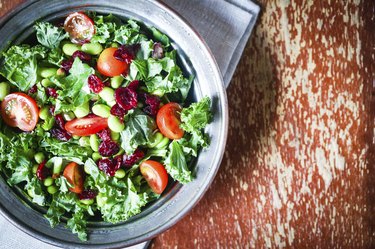
Glomerulonephritis is a type of kidney disease characterized by inflammation of the filtering mechanisms in your kidneys, called the glomeruli. When the glomeruli are inflamed, they cannot remove waste products and fluid from the blood efficiently. To control the amount of waste in your blood, you need to follow the proper diet plan developed by consulting with your doctor.
Protein
Video of the Day
The digestion of protein results in the formation of a waste product called urea. Normally, urea travels through the bloodstream to your kidneys where it is expelled from the body through your urine. If you have glomerulonephritis, your kidneys cannot remove urea from the blood properly. Urea in the blood puts strain on the kidneys, worsening your condition. Consuming too much protein can also cause urea to accumulate in your blood. Because protein performs a variety of functions in your body, including muscle growth and tissue repair, it is important that you do not restrict your protein intake too much. Work closely with a dietitian to determine exactly how much protein you need and do your best to meet your daily goals.
Video of the Day
Sodium
Sodium helps regulate the amount of fluid in your body. If your blood contains too much sodium, it triggers your kidneys to retain water, which increases your blood volume and can increase your blood pressure. High blood pressure puts excess strain on your kidneys, worsening your kidney disease. If you have glomerulonephritis, your dietitian may recommend a sodium restriction. When reducing your sodium intake, avoid adding salt to foods, as well as canned foods, processed foods, salted snacks and processed meats, like bacon and ham. You can use fresh herbs and sodium-free spices in place of salt, but do not use salt substitutes, which replace sodium with potassium.
Potassium
When kidneys fail, they cannot properly filter excess amounts of potassium from the blood. If potassium levels get too high, it can disrupt proper muscle and nerve function, causing irregular heart beat and even heart attack. To prevent potassium from building up too high in your blood, your dietitian may recommend that you reduce your intake of potassium-rich foods, such as bananas, sweet potatoes, oranges, spinach, tomatoes, nuts, legumes and dairy products.
Fluids
In the later stages of glomerulonephritis, you may be placed on a fluid restriction. When your kidneys are damaged, they cannot remove excess fluid from your body. As a result, fluid can build up in your body tissues, causing edema, which is a generalized swelling from too much fluid. The amount of fluid you are allowed to consume depends on your level of kidney function.